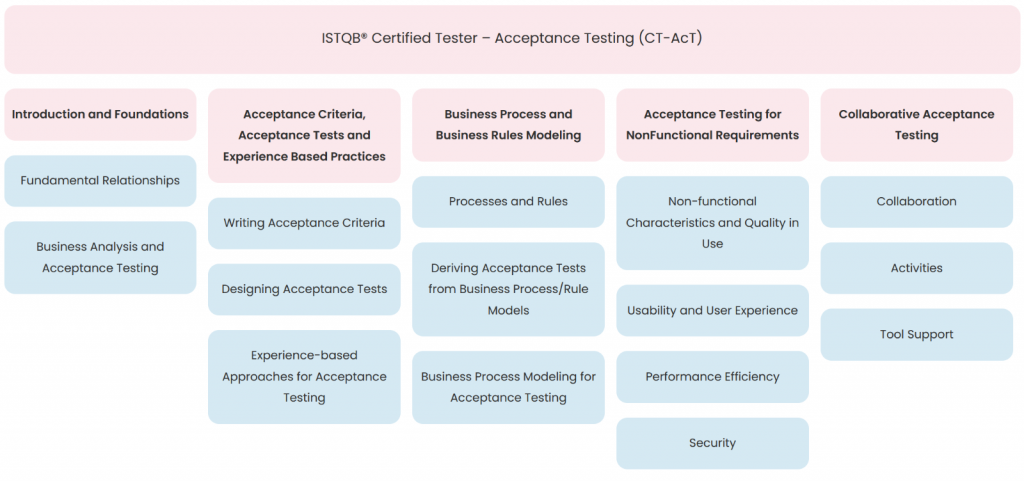
ISTQB® Certified Tester – Acceptance Testing | 24 & 25 November 2025 | Vilvoorde
November 24 @ 9:00 am – November 25 @ 5:00 pm

Embark on a journey of professional growth and innovation with our dynamic ISTQB® Certified Tester – Acceptance Testing (CT-AcT) course.
The ISTQB® Certified Tester – Acceptance Testing (CT-AcT) certification equips you with the essential skills to effectively perform acceptance testing, ensuring that software meets business requirements and user needs. This certification covers the principles and techniques of acceptance testing, aligning with the best practices in software development.
Objectives
The objective of the Certified Tester Acceptance Testing (CT-AcT) certification is to equip professionals with the essential skills and knowledge to effectively perform acceptance testing, ensuring that software meets business requirements and user needs.
Targeted audience
The targeted audience for the ISTQB® Certified Tester – Acceptance Testing (CT-AcT) certification includes anyone involved in software acceptance testing activities. Specifically, this certification is aimed at professionals in the following roles:
- Product Owners: Responsible for defining the features and requirements of a product, ensuring that acceptance testing aligns with business objectives.
- Business Analysts: Professionals who analyze business needs and translate them into requirements, playing a crucial role in defining acceptance criteria.
- User Acceptance Testers: Individuals who perform acceptance testing from the end-user perspective to ensure the software meets user needs.
- Test Analysts: Specialists who analyze test results and provide insights to improve software quality.
- Test Engineers: Professionals who design and implement test cases, including acceptance tests.
- Test Managers: Leaders who oversee testing activities, ensuring that acceptance testing is integrated into the overall testing strategy.
- Software Developers: Professionals who develop software and need to understand acceptance testing to collaborate effectively with testers and ensure their code meets acceptance criteria.
This certification is designed to enhance the skills and knowledge of these professionals, enabling them to contribute effectively to acceptance testing activities and ensure that software meets business requirements and user expectations.
Prerequisites
To gain the ISTQB® Certified Tester – Acceptance Testing (CT-AcT) certification, candidates must meet the following prerequisites:
- Certified Tester Foundation Level (CTFL) Certificate:
Candidates must hold the ISTQB® Certified Tester Foundation Level (CTFL) certificate. This foundational certification ensures that candidates have a basic understanding of software testing principles and practices, which is essential for advancing to more specialized areas like acceptance testing.
- Pre-CTFL 4.0 Certification Holders:
If you hold a pre-CTFL 4.0 certification and want to be fully aligned with testing in acceptance testing environments, this course and certification is the best option for you. It provides the necessary updates and specific knowledge related to acceptance testing.
Course Outline

- Introduction and Foundations
- Overview of acceptance testing and its importance in the software development lifecycle.
- Fundamental relationships between acceptance testing and other testing activities.
- Business Analysis and Acceptance Testing
- The role of business analysis in defining acceptance criteria.
- Aligning acceptance testing with business goals and requirements.
- Acceptance Criteria, Acceptance Tests, and Experience-Based Practices
- Writing clear and actionable acceptance criteria.
- Designing comprehensive acceptance tests.
- Experience-based approaches for acceptance testing.
- Business Process and Business Rules Modeling
- Understanding business processes and rules.
- Deriving acceptance tests from business process and rule models.
- Business process modeling techniques for acceptance testing.
- Acceptance Testing for Non-Functional Requirements
- Non-functional characteristics and quality in use.
- Usability and user experience testing.
- Performance efficiency testing.
- Security testing.
- Collaborative Acceptance Testing
- The importance of collaboration in acceptance testing.
- Key activities that promote collaboration.
- Tool support for collaborative acceptance testing.
Course Delivery
Duration: The course is typically delivered over two days.
The course can be organized in a live classroom or live virtual classroom setting.
Trainer: An accredited trainer with experience in software testing will lead the course, providing real-life examples and mock exams to prepare participants for the certification exam.
Materials: All training materials are provided at the start of the training, and the course is conducted in English.
The Exam
Format: The exam consists of 40 multiple-choice questions.
- Total Points: 40
- Passing Score: 26
- Duration: 60 minutes (with an additional 25% time for candidates whose native language is not the exam language).
Delivery: The exam can be taken via a Flex (remote) or in an exam center of choice (Pearson VUE).
Administration
Pricing
€ 1.240/person for two days. All prices include the exam fee, which is subject to change. All prices are VAT excluded; course material, exam, lunch and beverages are included.
Course Logistics
All courses begin promptly at 9 am and are scheduled until 5 pm.
This course is organised in a Live Classroom. When required, you can organise an in-company format training course. Please reach out to us for more information.
Terms and Conditions
Find our Terms and Conditions for the training here.


